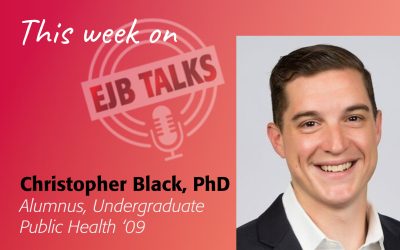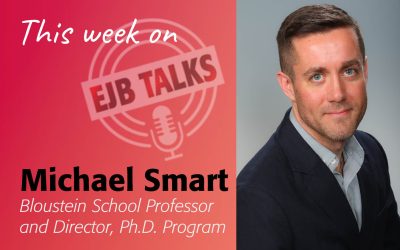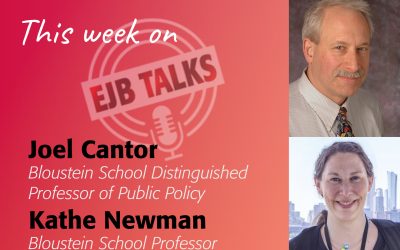Will the nature of college be forever changed by the pandemic and the ensuing recession? This is just one of the questions discussed on EJB Talks this week. Stuart Shapiro and Marc Weiner, Executive Director of Undergraduate Programs for the Bloustein School, examine why the sudden, emergency transition to online education was not an easy one. They also discuss how schools like Bloustein, which employ faculty already cross-trained in hybrid learning, were able to better maintain the quality of teaching as it moved to online learning. Recorded just before a federal judge rescinded the ICE announcement barring foreign students from online study in the U.S., they also touch upon what the move by ICE would have meant for colleges and universities, as well as how enrollments may change as America likely heads into another multi-year recession.
>Stuart Shapiro
Welcome to another episode of EJB Talks. I’m Stuart Shapiro, the Associate Dean of the Faculty at the Bloustein School. And the purpose of this podcast is to talk with my colleagues and our alumni about issues affecting people in New Jersey, the United States, and the world. COVID 19, the ensuing recession, and the George Floyd murder affected all of these groups and have been the subject of many of our podcasts.
Today, however, we are going to be talking about an effect of these crises that really hits home for us. How higher education has been roiled over the past few months. Today I’m very lucky to be speaking with Professor Marc Weiner who is the Executive Director of our Undergraduate Program. Prior to that Marc taught at Bloustein and was one of our leading experts on survey research. Marc, thanks for coming on the podcast.
Marc Weiner
My pleasure.
Stuart Shapiro
Let’s start by giving people an idea of the size of the program we’re talking about that you run at Bloustein School. How many students do we have? What majors do we have? How big is our undergraduate program?
Marc Weiner
There’s really two numbers that we’re talking about. So let’s talk about majors first. At the close of spring 2020, we had 1,039 majors across five degree areas. Of those, 269 graduated in May. So about 770 continue into this academic year. And as students close out their summer school courses, by which they’re fulfilling prereqs to declaring a major or majors will be back in the low 900s. And by the end of the fall semester, declarations will be back up over 1000. And then, that cycle repeats. It’s a lot like the stock and flow of migration. People come into the major, they graduate out of it. And that’s got to be distinguished from enrollments, which is colloquially known as “butts in seats.” So if you have one major who is taking 15 credits, she counts as one major, but she’s five enrollments. So as of this morning, because I get a weekly report, we have 4012 enrollments in undergrad for fall 2020, which is 86% of last year, fall 2019. And so that’s going to speak a little bit to one of our later questions.
Stuart Shapiro
So, we’re talking about a major enterprise here.
Marc Weiner
Interestingly enough, my friend, Distinguished Professor David Listokin, has said to me that you run a small school at undergrad. And in many ways, yes. It is interesting to note, though, that we are the smallest of the schools at Rutgers-New Brunswick. So there’s the question of scale.
Stuart Shapiro
So you talked about, you compared fall ’20 to fall ’19. Of course, the world in fall 2020 is a very different place than the world in the fall of 2019 was. Obviously, we’ve had all the crises I outlined at the beginning and one of the most high profile changes that we’ve had to deal with, as a result of the pandemic, has been the wholesale movement of classes online. We obviously had some classes online before all this happened. But now, this fall, we’ll have everything online. Can you talk a little bit about online education, particularly what about the misperceptions about it that are out there?
Marc Weiner
Sure. Two of our peer universities, Illinois and Arizona State, actually have websites on the misconceptions of online education. And, for example, Arizona lays out five and Illinois lays out 10. And in both cases, the number one misperception is that the courses are easier. And then there’s a series of others, that there’s no time limit, the quality is lower, they don’t transfer, it’s difficult to get hold of your instructor, there’s no interaction with other students. And in a traditional sense, some of those misconceptions are true. So they’re not actually misconceptions. The amount of face-to-face interaction is mediated. We can go back to Rousseau’s concept of the “mediated life.” And the fact is, that we are talking, here, not face-to-face but in a mediated context.
So the fundamental difference is, that in a live instructional setting, the relationship between instructor and student is psychodynamic. It’s not mediated, it doesn’t pass through any particular media, and the internet is that. So, thinking of teaching and learning as a psychodynamic process, Associate Professor Francis Barchi and I are embarking on a multi-year process to study the conversion to remote. And the fundamental question is…. we just had a long talk about this Friday afternoon. One of the fundamental questions is who are the relevant players and what is their relationship to this? Instructors? Students? And in both cases, what are their capacities? What are their levels of familiarity with the technology? What about the inequality of access?
Back in the 2010s, I published an article in the Journal of Poverty, about the inequality of access to broadband and that has really emerged as a critical issue. Some subject matters are more amenable. STEM, particularly elementary physics, mathematics are simply more amenable to online. A professor and I forget where he’s located, named Handelsman, wrote the book on this several years ago. You have to remember, almost everything in our lives has moved online. I have not been to a motor vehicle agency to renew my registration in years when we used to have to do things like that in person. So there are questions of human connectivity that get lost in the online context, the inability to actually have that space in between. ASU calls the question of real faculty. You know, that’s another interesting question. Because in Bachelor of Science degrees, which are career preparatory degrees–which four of our five degrees are–our PTL practitioner faculty are just as much a critical part of the teaching cohort as our full-time faculty who publish and do research.
So in terms of misconceptions about higher education, we’ve really just begun to study that. I think the first misconception though, the most important one, is that you can’t connect. The question of the instructor being schooled and skilled and trained to work through the media–by which I mean the internet–to have facile programs; Zoom is better than WebEx, and so on, to make it happen. That said, personally, I prefer teaching in person. I think you do as well. However, we have a major public health crisis, and teaching in person is not, it’s not advised.
Stuart Shapiro
So, I’m preparing my fall class now for the first time, preparing to teach online and more ……
Marc Weiner
I might add, you have full enrollment.
Stuart Shapiro
Thank you. Well, I’m really good. (laughing) So, in March like everyone, I moved online as an emergency measure. But now for the first time, I’m preparing an online class. I don’t know whether, what exactly the questions you and Professor Barchi are going to study, but I have a hypothesis for you and you can react to it. That teaching online and doing a good job is, if anything, more work than teaching in person. Teaching online and doing a poor job, maybe a lot less work than doing a poor job in person.
Marc Weiner
Yes, I think that’s true. I think that’s true. A lot depends upon the origin skills of the instructor. For example, those who pivoted in spring 2020, who had never taught online before, had a very difficult and steep learning curve. Steep and rapid learning curve. Those who were cross-trained, and one of my initiatives early on as Executive Director Undergraduate Programs, was to cross-train as many of our instructors as possible to be able to teach online in addition to teaching in person. And we have a number of hybrid courses that have both components. And so, one critical question to your hypothesis is, what is the origin point of training and the familiarity? As the instructor cohort ages out, and those of us who didn’t grow up with the internet, we become the elder cohort. And pretty much the entire instructional cohort grew up with the internet and grew up with these modalities. We’re going to see a fairly steep improvement in origin point.
Stuart Shapiro
Yes. So some schools–Purdue, Notre Dame, come to mind–are trying to come back in person this fall. Rutgers announced last week, President Holloway announced, that we will be largely remote. Can you talk about the decision to go fully remote and how you think it’ll affect undergraduate programs?
Marc Weiner
I’ve thought about that a lot. I mean, large universities are like ocean liners. It takes a lot of planning to start, to stop, to turn them. And in an epidemiologically-fluid situation like this, which has very unfortunately been perversely politicized, I’d say that a number of institutions made those decisions too soon. For example, Mitch Daniels, former governor of Indiana and current president of Purdue had an op-ed in the Washington Post on May 25. And all you need to do is to look at the curve in COVID mortality and morbidities from May 25, where we were well into the pandemic. To now, in order to appreciate how difficult it is to anticipate what’s going to happen. So, hotspot places like New York and New Jersey, California; unfortunately, we were leading indicators. All you have to do is look at the paper today to see what the rate is in Florida, which is just absolutely fascinating.
Stuart Shapiro
Right.
Marc Weiner
Other things that go into that rationale include–and I alluded to this just now–regionality. Which means density. New Jersey is the densest state in the union. New Brunswick, Newark, Camden are compact compared to large Midwestern universities, which are much more spread out. And so, there’s a greater opportunity to have the framework for social distancing. Money. Politics. The problem is, though, that you can have all of the greatest frameworks in the world but we are dealing with undergraduates and graduate students. We’re dealing with young people. And there is a psychology to public health compliance, that can’t be ignored. And I don’t want to cast an aspersion saying that all young people are foolhardy and wouldn’t follow directions. But it is human nature, over time, to go over the speed limit. It is human nature over time, to ignore that no turn on red sign when we think we can get away with it. And, I am loath to quote Donald Rumsfeld, but we have “unknown unknowns” here that are still playing out.
The other thing I think is important is that undergraduate enrollment is dynamic. So, juniors want to finish, freshmen will slump, sophomores are most likely to take a year off. So we’re going to see an impact on enrollment that’s going to exacerbate pre-existing conditions. The concept of “sophomore slump” goes back to the beginning of the century. So, the idea of somehow that a freshman who has completed their year, they pivoted in their spring semester, it was a potentially unpleasant experience. And now they’re thinking, oh, maybe I’ll take a year off. That, though, leads to the question of, what will they do during that year when we are seeing radical, radical unemployment?
Stuart Shapiro
Right. That leads into the next question.
Marc Weiner
I thought it might.
Stuart Shapiro
Yeah, I appreciate that. Always good to make the host’s job easier! So, we are in a recession. I suspect that we will be in a recession for three or four years at a minimum, now. That this is a very serious downturn, that even after a vaccine comes–and hopefully that’s sooner rather than later–that the economic dislocation we’re experiencing will not correct itself immediately. What do you think the effects of the economy are going to be on colleges and universities as you think about our program for the next few years?
Marc Weiner
It’s a really complicated question. Let me see if I can unpack some elements. First I want to put a plug in, in terms of the impact of the coronavirus environment on the economy in general. I want to put a plug in for Rutgers Regional Report Fast Track Research Notes, which is authored by our former dean and a former university professor. Our former Dean, Jim Hughes, a former University Professor Joe Seneca, and Connie Hughes, who is a Bloustein School alumni and was also a chief in management policy in the governor’s office and a whole host of other things. They are coming out with a month-by-month, the first one came out in May, the second one came down in June, they’re available for free download from the Rutgers SOAR, which I forget what those initials stand for. Their Fast Track Research Notes are month-by-month parsing the data and doing their best to make predictions with regard to, where we think things are going to head sector by sector, and education is one of those sectors.
There is a well-known relationship, though. There is literature on the relationship between national unemployment rates and college enrollment. And I don’t want to get too wonky. But, college enrollments and success outcomes at public four-year institutions of higher education–and you really do have to distinguish there between public and private–are clearly affected by variation in the national unemployment rate. So just to jump to that punch line. As the unemployment rate goes up, college enrollments tend to go up. And so, this factors into that sophomore’s decision to take a year off, and do what? So, for undergraduate enrollments, there’s about a 1 to 1.2 to 1.9% ratio between the unemployment rate and college enrollments. I don’t want to paint that as a silver lining. But it might not be a bad idea, with unemployment so high, for enrollment for a student who can and can afford to, to enroll. And we’re seeing that in our numbers. At this point for fall–and first-year students have not yet been sectioned, which is the formal name for getting them registered–we’re at 86%, as I said, of fall 2019 capacity. And I would expect to reach fall 2019 capacity. And I have to use that as a pre-COVID baseline. It’s the closest thing I have, and that was during a booming economy.
Stuart Shapiro
Perhaps I’m naive, but I also hope that majors like public health, health administration, public policy, urban planning, are more attractive when they are the types of fields one can go into, to try to deal with the problems 18-year olds are seeing that society is having.
Marc Weiner
That’s an incredibly apt point. And I second that motion. I mean, in a weird way, I don’t want to make light of anything, but there’s a saying that war is how Americans learn geography. Pandemic is how Americans learn public health. And it’s an uncomfortable truth. And so I agree with you that, we should see upticks in these majors for that very reason. Also, you know, politics tends to generate interest. When politics are good, and everyone’s happy political science and public policy are down. Politics in the Trump Administration have been interesting.
Stuart Shapiro
Not normal, one might say?
Marc Weiner
What one might say, not normal. I want to put a plug out for your book, “Not Normal,” it still holds up! It holds up because this is not normal. So everybody should get a copy of Stuart Shapiro’s book, “Not Normal” (laughing), which discusses, mostly the Trump race, the candidacy, right?
Stuart Shapiro
Yes, the first year of the Trump administration.
Marc Weiner
And it’s really great. It’s great reading. It holds up.
Stuart Shapiro
So I want to hit one more issue before we let you go and it’s more a hot off the presses issue or relatively hot. Last week, the Immigration and Customs Enforcement Agency, commonly known as ICE, issued an order forcing international students to go home if all of their courses were online. Can you talk a little bit about the massive effects this is going to have on colleges and universities?
Marc Weiner
Well, we know some things. And I want to have a shout out not only for Bloustein’s rapid response but for Rutgers Global led by Rick Garfunkel, who’s the Vice President for Global Affairs, remarkable, rapid response. The student and exchange visitor program put out a broadcast message about what does and does not apply directly to Rutgers. And for any international students listening. They will need newly issued I-20s verifying that the school is not operating in a hybrid mode. So when you saw President Holloway’s message he specifically used the phrase hybrid mode. There is a lawsuit, Rutgers has joined the lawsuit. It was initially filed by Harvard and MIT, and my understanding is that all Big 10 and Ivy League schools will be joining if they have not already that lawsuit. And there are already schools, for example, Monmouth University reported on July 10, which was Friday, that they were taking the one class rule. That if there was one class in person, and the rest were remote, that that would satisfy the hybrid status. It would allow international students to remain in the United States. The punch line is, it’s too fluid to know. Things will play out in the court, I imagine. Whatever the motivation behind the ICE rule is, and I don’t want to get overly political, but whatever that motivation is, I have a feeling that’s going to get up to the Supreme Court. And this Supreme Court has been nothing, if not unpredictable.
Stuart Shapiro
Yeah. That’s for sure.
Marc Weiner
So it’s hard to know. But I think that the answer to the question in a succinct way is that Rutgers and similarly situated institutions have done a rapid response job to try and figure out what’s going on, to try and have the backs of our international students, who really bring a richness of experience and worldview that enhances the entire educational experience for everybody. But it was a difficult blow.
Stuart Shapiro
Yeah. And certainly, I know our big hope is that the Harvard/MIT lawsuit that has been filed results at least in a stay, of that, that allows students for the fall to stay in the country if they’re taking online only. This is going to be an impossible question to answer, but I’ll ask it anyway. It’s been a crazy, four-month period, unlike anything I know either of us has seen in the world or in higher education. What do you think the next year holds?
Marc Weiner
Well, I believe in science. I really do.
Stuart Shapiro
You’re a rebel.
Marc Weiner
So apparently everything old is new again. (laughing) So I believe in science and I believe next year holds a vaccine. I believe next year holds a political realignment. And I believe next year holds hope. And I also believe that you and I are going to be very, very busy next year.
Stuart Shapiro
I think that’s true. And at least that ends us on a somewhat hopeful note there. So thanks, Marc, for coming on today.
Marc Weiner
My pleasure. I appreciate the opportunity.
Stuart Shapiro
I’d also like to give a big thank you to Tamara Swedberg, Amy Cobb, and Karyn Olsen, our production team. We’ll be back next week with another talk from another expert at the Bloustein School. Thanks for listening and stay safe.




